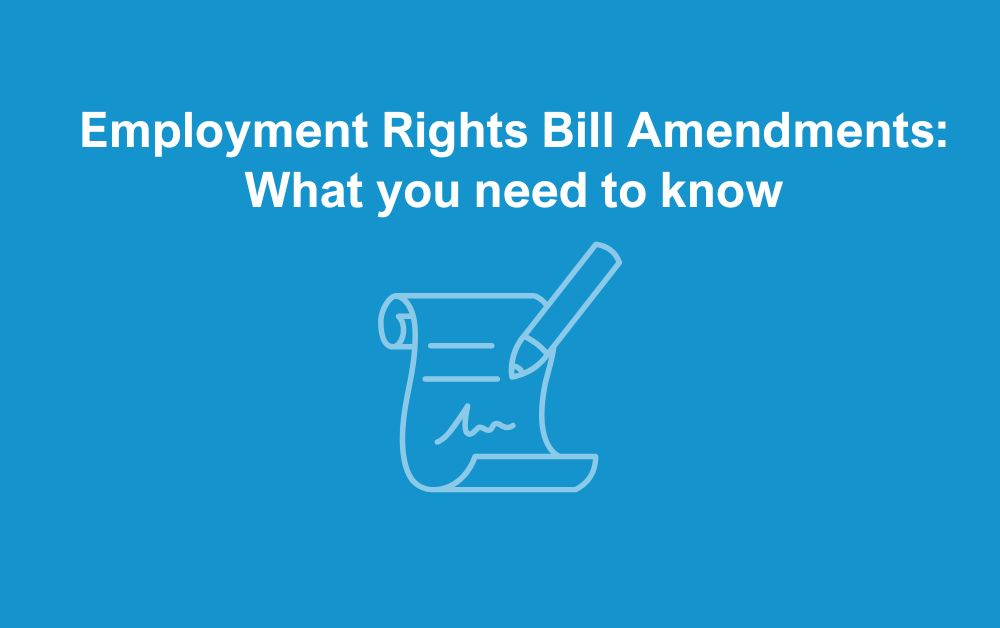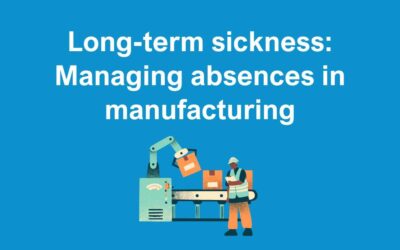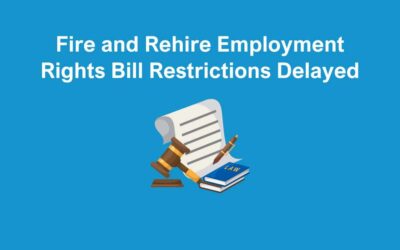The Government proposed Employment Rights Bill amendments yesterday after consulting with trade unions and business groups. The bill was originally introduced in October 2025, and was described as being ”biggest change to workers’ rights in a generation”. As an employer, it’s crucial to stay informed about these changes as the bill progresses through Parliament, ensuring you are prepared to take action when necessary.
Business Secretary, Jonathan Reynolds said: “Many businesses already have worker friendly practices in place and can attest to the positive impact they have on retention, productivity and job satisfaction. We want to go further and untap the UK’s full potential by attracting the best talent and giving business the confidence to hire to help the economy grow,”
Here are key changes so far:
Zero-hours Ban
The Government originally proposed that employees will be entitled to a guaranteed hours contract if they consistently work regular hours over a set period. As part of employment rights bill amendments, the ban will also include agency workers. This means that if you currently work with agency workers, you may need to provide them with a more stable contract.
These changes has been put forward in order to provide workers with fairer working conditions. However, this can lead to higher costs for employers. It’s important to look at budgeting for wage costs now to understand what this might look like.
Statutory Sick Pay
It has been suggested that all workers will be entitled to Statutory Sick Pay and there will no longer be an earning limit to qualify. These employment rights bill amendments grant up to 1.3 million more workers entitlement to Statutory Sick Pay (SSP). Low earners will receive either 80% of their average weekly pay or the current SSP rate, whichever is lower.
Again, this will come as a great benefit to employees. However, it may with some complications for employees such as higher costs and administration constraints. We encourage you to look at admin tools now to be prepared for this possible change.
Collective Redundancy
If the employment rights bill amendments are eventually passed, employers will have to pay 180 days worth of compensation if employees have not been consulted with correctly throughout the collective redundancy process. This has doubled from the original 90 days. This means that employers will be unable to change contract terms without appropriate notice and consultation. Fines and compensation will also be more costly if the process has not been handled properly.
Avoid an employment tribunal by leading with transparency and following legislation when making changes to contracts. If you would like help with employment contracts, contact our HR experts today.
Bereavement Leave After Miscarriage
Employment Rights Bill amendments will mean that employees who have suffered a miscarriage before 24 weeks will be entitled to two weeks’ bereavement leave. Employers will need to pay employees for these two weeks. This is in an attempt to support employees and improve compassion in the workplace.
HR policies will need to be updated to reflect this if this becomes law.
Employment Rights Bill
The points above were the key takeaways from the employment rights bill amendments. It’s important to also keep in mind suggestions originally made in October. This includes:
- Unfair dismissal protections will become a day-one right, eliminating the current two-year service requirement.
- Flexible working will become the default where practical, granting employees the right to flexible working arrangements unless employers can demonstrate infeasibility.
- Government considering enhanced protections for women returning from maternity leave, potentially making dismissal within six months unlawful, with some exceptions.
- Flexible working to become a day-one right unless employers can prove it is not feasible.
- Paternity and parental leave to be a day one right
Key Timeframes and Preparation
- The Bill is expected to take up to 18 months to pass through Parliament, with most changes unlikely before 2026.
- The Government will consult further, meaning reforms may change.
- Businesses should review policies in preparation—our HR experts can assist.
- We will keep you updated on any developments on the employment rights bill amendments.
How The HR Booth Can Help
At The HR Booth, we understand that navigating employment law changes can be challenging. Our team of HR experts is here to help you stay compliant and adapt to new regulations smoothly. Here’s how we can support your business:
- Policy & Contract Reviews – We can review your existing policies and employment contracts to ensure they align with requirements.
- Workforce Planning & Budgeting – We’ll help you assess the financial impact of wage adjustments and statutory sick pay changes, ensuring your business is prepared.
- Employment Law Guidance – Stay ahead of compliance requirements with expert advice on collective redundancy, maternity protections, and bereavement leave updates.
- Flexible Working Solutions – We can assist in implementing flexible working policies that align with legal obligations while supporting business operations.
- HR Support & Advice – Our team is on hand to provide ongoing guidance, training, and resources to help you manage these changes effectively.
Conclusion
The proposed Employment Rights Bill amendments will mark a significant shift in UK employment law, aiming to enhance workers’ rights and job security. While many of these changes benefit employees, they also introduce new challenges for employers, such as increased costs, policy updates, and compliance obligations.
It’s essential to stay informed and prepare for these reforms ahead of time. At The HR Booth, we can help you navigate these changes, ensuring your business remains compliant while supporting your workforce effectively. Get in touch with our HR experts today to discuss how we can support your business through these transitions.
We will continue to monitor employment rights bill amendments and provide updates to keep you informed.







